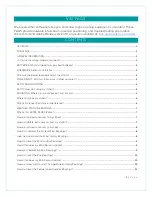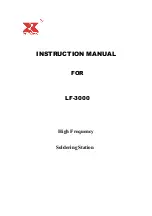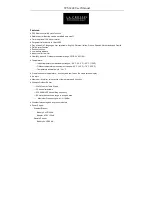
User instructions
EN
Presentation
The weather station GPS-KNX TG053A measures
the outdoor temperature, the wind speed and the
brightness.
It detects rain and daylight fall.
The weather station gets date/time and site loca-
tion data from GPS signals. It calculates also the
exact position of the sun (Azimuth and Altitude)
based on site co-ordinates and date/time data.
This information (brightness level and sun posi-
tion) is used to control blinds with slats based on
sun tracking for up to 6 building frontages.
TG053A compact case houses all sensors, elec-
tronic data processing gear, GPS antenna and
KNX bus connection.
The values measured are sent to the KNX bus as
physical values (2x8 bits ou 1 bit).
Each output has communication objects indica-
ting the measured and calculated values.
The state of outputs depends on one or more
levels.
Thresholds can be defined by settings or the
communication objects.
The weather station TG053A includes an annual
clock and a weekly clock. The clock channels can
switch the outputs using the communication
objects.
The weekly clock controls up to four different time
settings for each day of the week.
The annual clock can be used to define up to
three periods in the year with two daily ON/OFF
commands for each of them.
The switching times can be defined by settings or
the communication objects.
The weather station also has 8 logical AND gates
and 8 logical OR gates, each with four inputs.
All control events, time programs, and the 8 logi-
cal inputs (such as communication objects) can
be used as inputs of logical gates.
GPS, site location, date and time
The exact site location co-ordinates are received
from GPS signals. This information is required to
manage summer/winter time changes automati-
cally. On its first startup, the weather station uses
site location and date/time data provided by ETS
software until the first GPS signal is received.
Depending on ETS settings, the weather station
can process date/time information received from
GPS or KNX bus.
Installation and startup
Only qualified technicians must install, check,
start up and repair the appliance. Make a note of
all the lines to be installed with the appliance swit-
ched off and protect them against risks of being
powered up.
The weather station is designed only for the uses
described in this user manual. Any non-compliant
changes or breaches of the specifications in this
user manual will render the warranty null and void.
Check that the appliance is complete and in per-
fect condition (no mechanical damage) immedia-
tely after unpacking it.
If damage has occurred during transportation,
inform the supplier immediately.
If use without danger is not possible, switch off
the system and protect it against an accidental
restart.
The weather station must be used as a fixed sys-
tem. It must only be started after all the installa-
tion works have been completed and in an envi-
ronment designed for this purpose.
Hager refuses any liability for possible changes to
standards that may be made after the publication
of these instructions.
Location
Legend :
1. Spring-force auxiliary voltage terminal, suitable
for solid conductor up to 1.5 mm² or fine wire
conductor. Terminal assignment independent
of polarity (+/- or -/+).
2. Rain detector wiring connector included in box
cover
3. GPS antenna
4. GPS Signal LED
5. Connector KNX (+/-)
6. Physical addressing button
7. Physical addressing LED.
Technical characteristics
N
S
W O
N
S
E
O
N
S
W O
N
S
W
O
The output of each gate can be configured in
1-bit or 2 x 8-bit format.
ETS software performs KNX configuration.
ETS :
application software (database and
Installation Guide with descriptions available from
the Manufacturer).
Never start up a weather station that shows
signs of damage.
Select a clear site that allows for correct
measurements by the wind, rain and sun sensors.
South direction is advised for correct measurement
of brightness level.
The weather station must never be installed
beneath structures from which water may fall onto
the rain sensor after the end of the precipitations
(rain or snow).
The weather station must never be placed in the
shadow of a building or trees.
Arrange a space of at least 60 cm under the
weather station to allow for correct wind
measurements and to prevent snow from covering
the sensor.
Other factors may also interfere with or affect the
reception of the GPS signal, such as magnetic
fi elds, transmitters or radioelectrical interference
from fl uorescent light tubes, neon signs, switch
mode power supplies, etc.
RF
24 V
TP
Bus
30 V
M
KNX Medium
TP 1
Configuration mode
S-Mode
Rated voltage KNX
s
30 V SELV
Current consumption KNX
max. 8 mA
Auxiliary voltage
s
12 … 40 V SELV
v
12 … 28 V SELV
Auxiliary current
max. 185 mA at 12 V
s
max. 81 mA at 24 V
s
Operating temperature
-30 … + 50 °C
Operating altitude
max. 2000 m
Storage/transport temperature
-30 … +70 °C
Dimensions (W x H x D)
ca. 96 x 77 x 118 mm
Weight
170 g
Degree of protection
IP44
Surge voltage
1500 V
Overvoltage category
III
Degree of contamination
2
Software
class A
Action type
type 2
Precipitation sensor:
Measurement precipitation
Yes/No (1 bit)
Heating
approx. 1.2 W
Temperature sensor:
Measuring range
-30 … +80°C
Resolution
0.1 °C
Measuring accuracy
±1°C at -10…+85°C,
±1,5°C at -25…+150°C
Wind sensor:
- Measuring range
0 … 35 m/s
- Resolution
0.1 m/s
- Measuring accuracy ± 15% of measured value
Brightness/twilight sensor
- Measuring range
0 lx … 150 klx
- Measuring accuracy
± 15 % at 10 … 150 klx
1
6LE002905A
6LE002905A
TG053A
z
o
z
Weather station GPS-KNX
o
Værstasjonen GPS-KNX






















